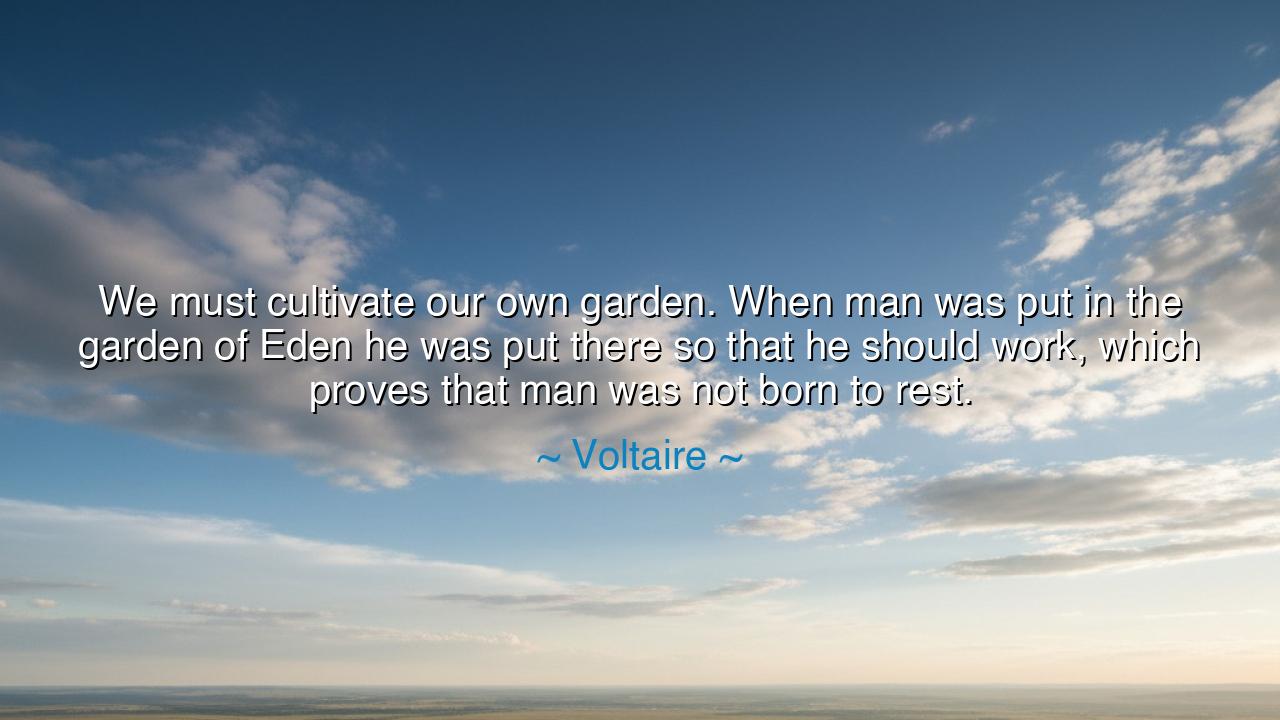
We must cultivate our own garden. When man was put in the garden
We must cultivate our own garden. When man was put in the garden of Eden he was put there so that he should work, which proves that man was not born to rest.






In the sacred tapestry of existence, there are truths woven so deeply into the fabric of life that they have stood the test of time. One such truth is found in the words of Voltaire, who proclaimed, "We must cultivate our own garden. When man was put in the garden of Eden he was put there so that he should work, which proves that man was not born to rest." In these profound words, we are called to understand the true nature of our existence—to embrace work, to seek purpose, and to recognize that our lives, like the garden itself, must be tended with effort, dedication, and constant care.
At the heart of Voltaire’s wisdom lies the idea that man was placed in the Garden of Eden not for leisure, not for comfort, but for labor. The very act of work is intertwined with our being, a part of our essence. In the garden, man’s purpose was to till the soil, to nurture the earth, and to cultivate life. This is not a story of idleness or ease but a reminder that the divine saw in man the potential to create, to shape, and to mold the world around him. Just as the garden requires the gardener's hands to cultivate and nourish it, so too do our lives require our own effort, our own tending.
The ancient wisdom of the Sumerians, the earliest known civilization, bears witness to this truth. In the Epic of Gilgamesh, a tale of a king who seeks immortality, we find that the pursuit of meaning and purpose does not lie in escaping work or labor, but in confronting it. The gods themselves, in their divine wisdom, sent Gilgamesh on a journey where the answers were not in resting, but in the toil and effort that shape a king’s legacy. Like the garden, life itself calls us to cultivate our purpose through action, through sacrifice, and through dedication. The garden does not bloom by mere chance; it blooms through the gardener’s tireless effort, through each seed planted, watered, and nurtured.
Similarly, the story of the ancient Chinese philosopher Confucius offers wisdom on the matter of work and purpose. Confucius taught that a life without purpose was a life adrift. He often spoke of the necessity of cultivating virtue and wisdom through action—much like tending to a garden. For him, the work was not merely about the physical labor, but about self-cultivation, about aligning oneself with the natural order of the universe. Just as a gardener must learn the ways of the soil, the seasons, and the plants, so too must we learn the ways of the heart, the mind, and the spirit. Confucius believed that our work was an opportunity to grow, to refine ourselves, and to align with the greater good of the world.
Voltaire’s statement echoes this ancient understanding, reminding us that rest is not our true purpose. The garden’s work is endless, and the fulfillment that comes from it is not in the act of doing nothing, but in the act of shaping, creating, and nurturing. To be human is to be engaged in the act of cultivation—whether of the earth, of our communities, or of ourselves. In our work, we find meaning. In our efforts, we find fulfillment. Just as the gardener finds joy in seeing the fruits of their labor, so too do we find joy in seeing the results of our dedication to the tasks before us.
In the history of great leaders and thinkers, we see that those who shaped the world were not idle but were driven by a profound sense of purpose. Mahatma Gandhi, for example, was not a man of leisure. His life was one of constant work, both in the service of his people and in his own spiritual cultivation. Gandhi’s garden was not made of flowers and fruits but of freedom, justice, and nonviolence. Yet, like any gardener, he knew that his cause needed constant tending—his every action was a step toward shaping a better world. And much like the gardener who patiently waits for the seasons to change, Gandhi knew that real change takes time, takes effort, and takes work.
So, let us take Voltaire’s wisdom to heart and recognize that our own gardens—our lives—are not meant to be lived in idleness. We must tend to them, cultivate them, and shape them through purposeful action. Just as the garden requires the gardener’s hands to bring it to life, so too does our existence require our hands—our minds, our hearts, and our actions. Work is not a burden but a blessing, a call to become who we are meant to be, to create and to nurture. When we cultivate our own gardens, we are not merely maintaining a physical space but shaping our own destiny, our own legacy.
The lesson here is clear: work is not only the means to an end but the path itself. Just as the garden needs constant care to thrive, so too do we need constant effort to shape our lives, to fulfill our true purpose, and to grow into the individuals we are meant to be. Embrace your work, for in it lies your strength, your growth, and your purpose. Cultivate your garden, and in doing so, cultivate your life.






AAdministratorAdministrator
Welcome, honored guests. Please leave a comment, we will respond soon